Maine business leaders expressed serious concerns Thursday about how a new paid family and medical leave system would work in the state.
Northern Light Health said rules proposed by the state Department of Labor would require the hospital system to pay $16 million into the system, even though they already provide a similar benefit.
And smaller employers, including restaurant and brewery owners, said the hospitality industry hasn’t yet recovered from the COVID-19 pandemic and can’t possibly absorb long-term employee absences.
The comments came during a roundtable discussion organized by the Maine State Chamber of Commerce prior to a Monday public hearing on proposed rules for implementing the system.
Chamber CEO Patrick Woodcock called the rules “one of the most significant rulemakings in decades for the state’s labor laws and ultimately for our employees and employers.”
The new system became law in July 2023, making Maine the 13th state to establish a program.
Private and public sector workers will be eligible for 12 weeks of paid time off for family or medical reasons, including illness, to care for a relative or for the birth of a child, according to the labor department.
Payroll contributions to support the program will begin in January 2025, with benefits likely to begin in May 2026.
Most workers out on leave will make 90% of their regular wage, while those in higher income brackets will be paid 66% of their wages.
State law requires companies with 15 or more employees to contribute 1% of wages to the system, with half paid by the worker and half by the company. Those with fewer than 15 employees can deduct half of the amount from workers but are not required to make a company match.
When she signed the bill to provide $25 million in start-up funds, Gov. Janet Mills touted the system as a necessary support for Maine workers.
“It will make it easier for people to balance work with life’s unexpected challenges like caring for a sick child or an aging parent,” Mills said.
Woodcock said the business community wants to be a partner in making the system work, but that the rules as proposed are untenable.
One area of concern is that the proposed rules require companies that already offer their own paid family and medical leave benefits to pay in starting in January even if they don’t intend to participate in the system.
“They will not be able to avoid these new taxes and their employees will not be able to avoid these new taxes,” he said.
The rules allow companies to apply for an exemption in January 2026, but state that the exemptions cannot go into effect before April 1, 2026.
He said similar systems in Massachusetts and Connecticut allowed companies to opt out right from the start.

Another concern is that it will be up to employers to prove that they have an undue hardship if someone takes an extended leave, he said.
Paul Bolin, senior vice president of Northern Light Health, said the hospital system already offers benefits that go beyond what’s required by law. He said during the legislative process it was clear to him that companies that already provide the same benefit would be able to opt out.
As currently written, the rules will cost Northern Light Health $1 million a month, which adds up to $16 million until they can receive an exemption, he said.
“The benefits should be funded by the businesses and staff that are using it and not by those that aren’t,” he said.
Shipyard Brewing owner Fred Forsley, who also owns Sea Dog Brewing and Inn on Peaks Island, said his company does not currently offer a paid leave benefit.
But he emphasized that the restaurant industry is unlike other business, particularly since they are generally only profitable over the summer months.
“This is unworkable for the restaurant business,” he said. “It would be catastrophic. We are undersupplied with employees at every one of our locations.”
He said restaurants haven’t recovered from the pandemic and that many people don’t understand that the companies and workers will need to begin paying into the system starting January.
“Somebody needs to think about what the pandemic did to the restaurant business,” he said, noting that most restaurants are only staffed at 70-80%.
Jill Moses, owner of Three Dollar Deweys and Saltwater Grille, echoed many of those comments, saying that many workers have no idea that money will be taken out of their checks starting next year.
As the program ramps up, workers and the companies that employ them will have to pay in for 16 months before benefits can be paid out.
"The cost of living in Maine has gone up,” she said. “Groceries, childcare, everything has gone up. And to add this on them? People are already stretched thin.”
And while employers will be required to keep jobs on the books for those out on leave, in a place like a restaurant’s kitchen, it’s impossible to have everyone else cover the shifts, she said.
“We have to have a staffed kitchen,” Moses said. “That is very difficult as it is without three months off in the summer.”
The Maine Department of Labor will hold a public hearing on the proposed rules at 9 a.m. Monday in the department’s Frances Perkins Room at 45 Commerce Drive. All comments are due to the department by July 8.



